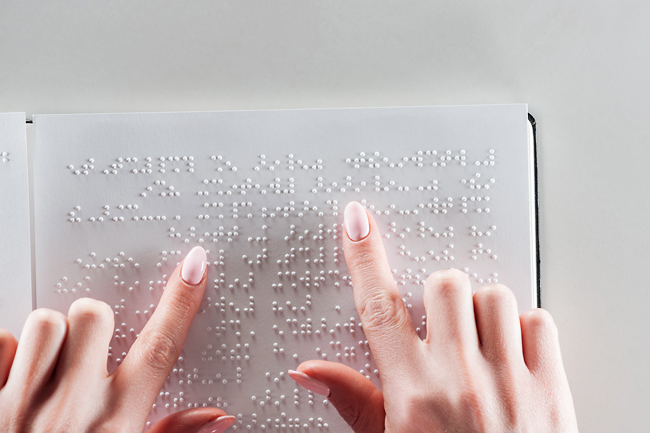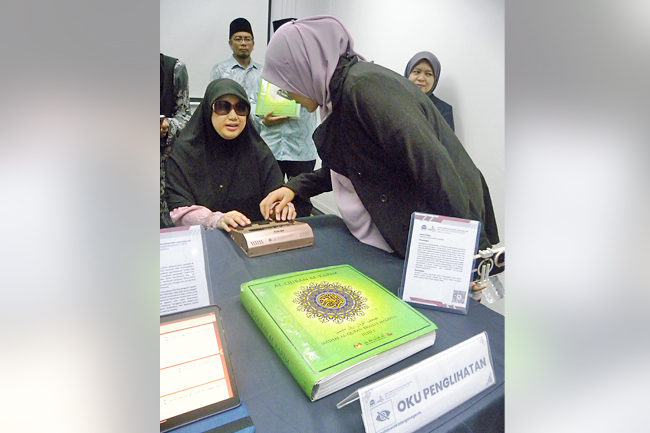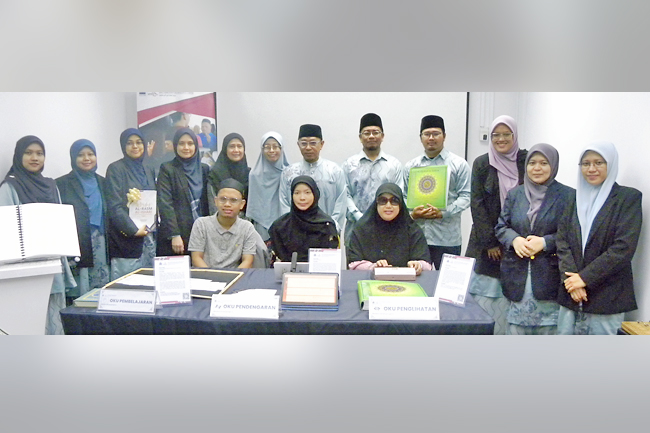For Muslims, Al-Quran is not merely a book but a beacon of light, guiding us through the intricacies of life. It is our spiritual compass, offering timeless wisdom shaping our understanding and enriching our souls.
In its pages, Muslims find solace, purpose, and a clear direction, helping us navigate the complexities of our daily lives with faith and resilience.
Al-Quran, as the word of Allah the Almighty, provides divine guidance for all of humanity, reminding us to reconnect with our Creator through worship, remembrance and obedience.
Its narratives of the Prophets and their steadfast faith amidst trials serve as enduring lessons, urging us to place our trust solely in Allah the Almighty.
The Braille Quran stands as a profound symbol of Islam’s inclusivity, embodying the faith’s commitment to ensuring that all believers, regardless of their physical abilities, can connect with the divine. For visually-impaired Muslims, this remarkable resource opens the door to independent engagement with the sacred texts, allowing them to experience the spiritual guidance and wisdom contained within Al-Quran firsthand.
Just as Al-Quran serves as a moral and spiritual compass for all Muslims, the Braille version ensures that this essential source of knowledge remains accessible to every member of the ummah, empowering visually-impaired individuals to study and embrace its teachings in their daily lives.
At the recent Universiti Islam Sultan Sharif Ali (UNISSA) Mahrajan Hafl Al-Takharruj, the power of inclusivity in Islam was beautifully showcased through the demonstration of the Braille Quran and Al-Quran Sign.



Among the highlights was the inspiring recitation of verse 17 from Surah Al-Qamar by visually-impaired Dayangku Soffiezah binti Pengiran Haji Abu Bakar.
Using an eBraille laptop developed by eDote Sdn Bhd in collaboration with Universiti Sains Islam Malaysia (USIM), her recitation resonated as a demonstration to the innovative strides being made to ensure that the teachings of Al-Quran are accessible to all.
His Royal Highness Prince (Dr) Haji Al-Muhtadee Billah ibni His Majesty Sultan Haji Hassanal Bolkiah Mu’izzaddin Waddaulah, the Crown Prince and Senior Minister at the Prime Minister’s Office, and Pro-Chancellor of UNISSA, graced the event while witnessing the demonstration during the 14th Mahrajan Hafl Al-Takharruj, or convocation festival, at the university’s Gadong campus.
The event highlighted the importance of making religious education available to every Muslim, regardless of physical abilities, reaffirming the commitment to accessibility and spiritual empowerment within the Islamic community.
UNISSA has hailed these projects as a significant advancement in making Al-Quran more accessible to individuals with visual and hearing impairments.
The recent demonstration showcased innovative techniques and tools designed to ensure that the teachings of Al-Quran reach everyone, regardless of their abilities. The initiative aligns seamlessly with the principles of Maqasid Syariah (Objectives of Islamic Law), which emphasise the protection and enhancement of human dignity – a testament to UNISSA’s unwavering commitment to inclusivity within Islamic higher education.
A pivotal force behind this progress is the Ibnu Ummi Maktum Research Centre (UMMI) at USIM, the first of its kind to operate in a hybrid manner.
UMMI serves as both a centre for people with different abilities (OKU) and an inclusive research centre within the higher education sphere. The centre is at the forefront of integrating Islamic education into special education, spearheading efforts to promote inclusivity and religious education for people with disabilities.
Through its pioneering work, UMMI is leading the charge in ensuring that Islamic knowledge is accessible to all, empowering individuals of all abilities to deepen their connection to their faith.
UNISSA, through its Centre for Leadership and Lifelong Learning (PKPSH) and the Faculty of Usuluddin, in collaboration with the UMMI at USIM, recently organised a ground-breaking basic course on teaching Al-Quran using Braille and Al-Quran sign at the Jame’ ‘Asr Hassanil Bolkiah Mosque in Kampong Kiarong.
This initiative, part of UNISSA’s 14th Mahrajan Hafl Al-Takharruj, aimed to equip participants with the essential skills of teaching Al-Quran Sign in a practical, hands-on manner, while raising community awareness of the unique needs of the differently-abled community.
The course saw an impressive turnout of 38 participants, including educators, officials from the Ministry of Education and Ministry of Religious Affairs, representatives from the Community Development Department, Ministry of Culture, Youth and Sports, academic staff from UNISSA, and other individuals.
Through this collaboration between USIM and UNISSA, the event not only increased the visibility of both Islamic higher education institutions but also positioned them as leaders in addressing the challenges faced by differently-abled individuals.
This aligns with the goals of becoming centres of excellence for empowering the differently-abled community, in line with the United Nations’ Sustainable Development Goals (SDGs), particularly SDG 4, which focuses on ensuring quality education as a foundation for sustainable development.
A highlight of the festival was the inspiring recitation of Al-Quran by Siti Nur Ruzana binti Masri, a hearing-impaired local who demonstrated the use of Al-Quran Hand Code, representing each letter of the Uthmani Rasm. Additionally, Muhammad Faris Akhyar Norakyairee, an autistic student from Malaysia, showcased his remarkable memorisation and recitation of Al-Quran using the Tahfiz Akhyar and Asyraf Tilawah methods, developed by the FAQEH Foundation.
Director of the UMMI at USIM Associate Professor Dr Haji Norakyairee bin Mohd Raus, briefed His Royal Highness on the centre’s ongoing efforts to enhance Al-Quran education for people with disabilities.
Through such initiatives, UNISSA and USIM continue to pave the way for greater inclusivity, ensuring that Islamic education is accessible to all, regardless of ability. – Azlan Othman



















































